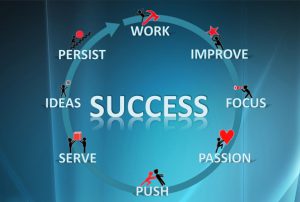What gets in the way of what you want, whether it is in business, family, friendships, or your spiritual connections: It’s you. What prevents you from being who you want to be or where you want to go is always the same: It’s you.
 By first identifying that you are the one getting in your way of success will allow you to figure out how to find success. The Enneagram is a nine-point model that helps people understand how they and their personality operate. The Enneagram has been taught at Stanford Business School and has become more visible in business training. The model describes nine personality types, or “lenses,” through which people see the world. We all have different strategies for a successful life. We all define a successful life differently and have different pathways to achieve that success. The Enneagram lenses represent the places each of us tend to focus on and spend most of out time doing.
By first identifying that you are the one getting in your way of success will allow you to figure out how to find success. The Enneagram is a nine-point model that helps people understand how they and their personality operate. The Enneagram has been taught at Stanford Business School and has become more visible in business training. The model describes nine personality types, or “lenses,” through which people see the world. We all have different strategies for a successful life. We all define a successful life differently and have different pathways to achieve that success. The Enneagram lenses represent the places each of us tend to focus on and spend most of out time doing.
No personality type is better than the next. Merely identifying that each person can see a situation differently, will shed light onto your own perspectives. This has a great deal to do with how you manage you business and team. To understand others, you must first understand yourself. Be more intentional about your actions. Ask yourself, what impact do I want to make?
Identifying Personality Types
The nine personality types are based on three centers of intelligence and perception: head, heart and body. Everyone experiences all three, but each personality type has a particular strength. This primary center influences our way of being in the world, and is an important key to overcoming blind spots and developing our potential. Balancing the three centers helps us achieve a more balanced life.
The Three Centers of Intelligence and Perception
Surprise, Surprise, the head is thinking-based. Head centered people lead with ideas, gathering information, figuring things out and making rational decisions before acting. Their focus is on creating certainty and safety, or finding multiple options. It is also known as the Intellectual Center. The three types classified under the head are the protector, mediator, and perfectionist.
As you can guess, the heart is feeling-based. Heart centered people act more on positive and negative feelings, empathy and concern for others, romance and devotion. Their focus is on success and relationship, performing up to expectations of the job or other people. It is also known as the Emotional Center. The three types classified under the heart are the giver, performer, and romantic.
Body centered types take leadership in body movement. They also use their sense of awareness and their gut to make decisions. Their focus is on personal security, control, social belonging and taking right action. It is also known as the Instinctual Center. The three types classified under the body are the observer, loyal skeptic, and epicure.
The Nine Types
The nine types are the: protector, mediator, perfectionist, giver, performer, romantic, observer, loyal skeptic, and epicure.
Head Types
 Protectors believe you must be strong and powerful to assure protection and regard in a tough world. Consequently, protectors seek justice and are direct, strong and action-oriented; they also can be overly impactful, excessive and impulsive. To read more click here.
Protectors believe you must be strong and powerful to assure protection and regard in a tough world. Consequently, protectors seek justice and are direct, strong and action-oriented; they also can be overly impactful, excessive and impulsive. To read more click here.
Mediators believe that to be loved and valued, you must blend in and go with the flow. Consequently, mediators seek harmony and are inclusive, amiable, easygoing, comfortable and steady; they also can be self-forgetting, conflict-avoidant and stubborn.To read more click here.
Perfectionists believe they must be good and right to be worthy. Consequently, perfectionists are conscientious, responsible, improvement-oriented and self-controlled, but also can be critical, resentful and self-judging. To read more click here.
Heart Types
Givers believe you must give fully to others to be loved. Consequently, givers are caring, helpful, supportive and relationship-oriented; they also can be prideful, intrusive and demanding. To read more click here.
Performers believe you must accomplish and succeed to be loved. Consequently, performers are industrious, fast-paced, efficient and goal-oriented; they also can be inattentive to feelings, impatient and image-driven. To read more click here.
Romantics believe you can regain the lost ideal love or perfect state by finding the love or situation that is unique, special and fulfilling. Consequently, romantics are idealistic, deeply feeling, empathetic and authentic; they also can be dramatic, moody and sometimes self-absorbed. To read more click here.
Body Types
Observers believe they must protect themselves from a world that demands too much and gives too little. Consequently, observers seek self-sufficiency and are non-demanding, analytic, thoughtful and unobtrusive; they also can be withholding, detached and overly private. To read more click here.
 Loyal Skeptics believe you must gain certainty and security in a hazardous world that you just can’t trust. Consequently, loyal skeptics are intuitive, inquisitive, trustworthy, good friends and problem-solvers, but also can be doubtful, accusatory and fearful. To read more click here.
Loyal Skeptics believe you must gain certainty and security in a hazardous world that you just can’t trust. Consequently, loyal skeptics are intuitive, inquisitive, trustworthy, good friends and problem-solvers, but also can be doubtful, accusatory and fearful. To read more click here.
Epicures believe you must stay upbeat and keep your possibilities open to assure a good life. Consequently, epicures seek pleasurable options, and are optimistic and adventurous; they also avoid pain, and can be uncommitted and self-serving. To read more click here.
So, figure out who you are because you are the only one holding yourself back from success. Figure out what personality type you gravitate towards most. Apply your strengths to your leadership style watch your team become more responsive.
Article resources from Personality Profiles as a Hiring Tool, by Scott Jamieson in the October 2015 edition of Lawn and Landscape.












